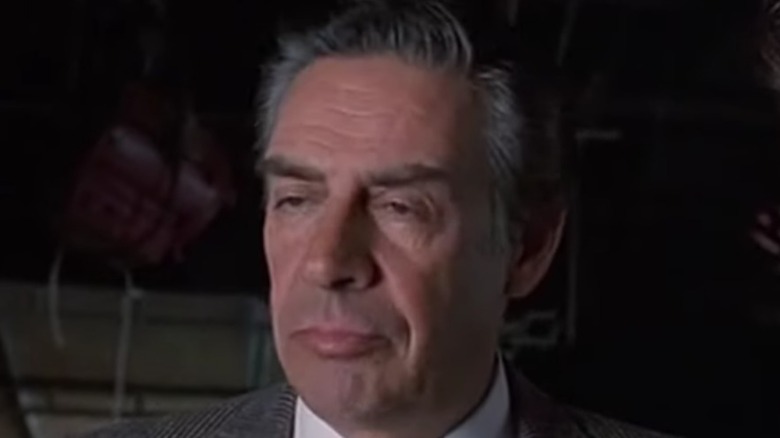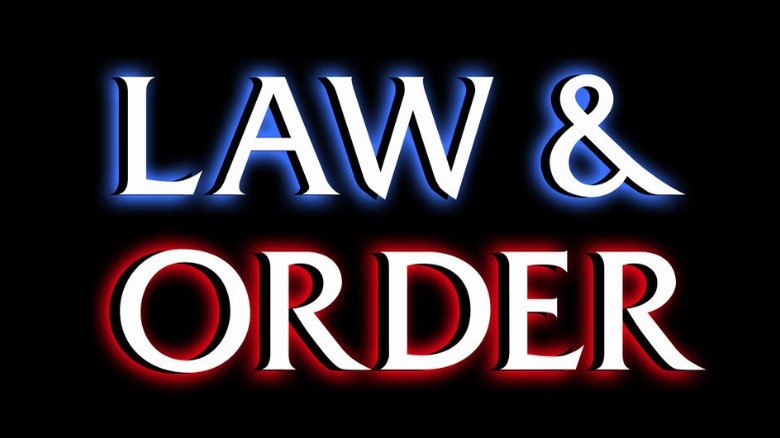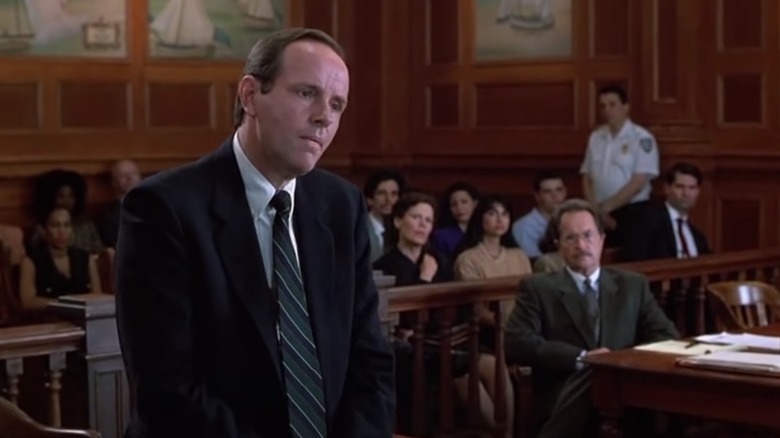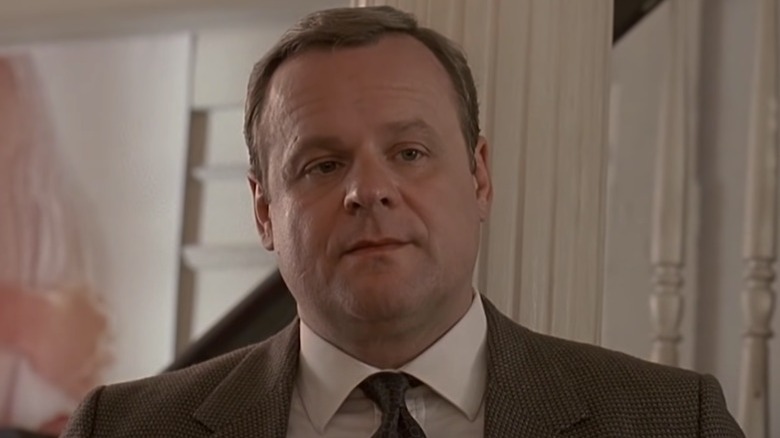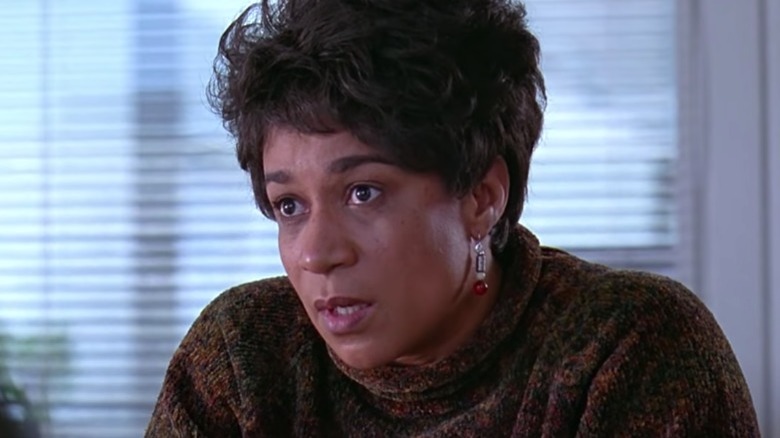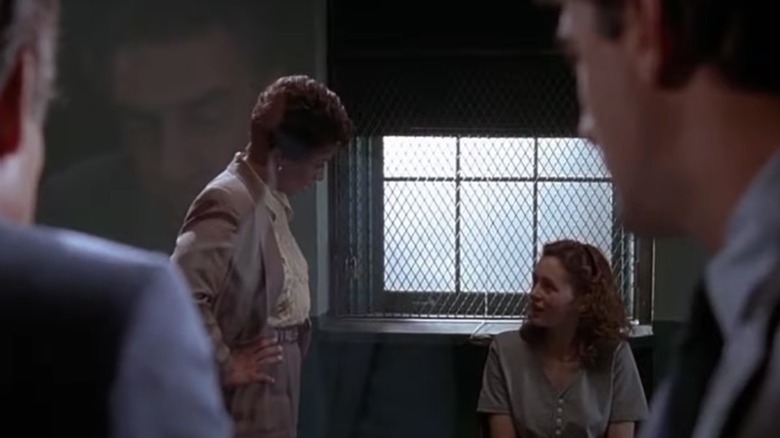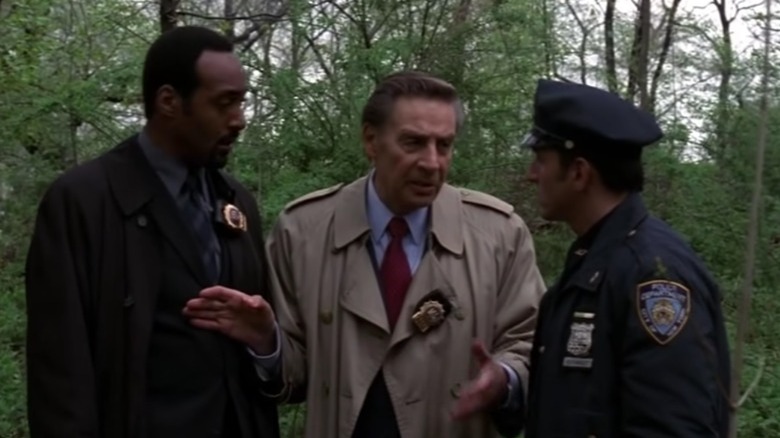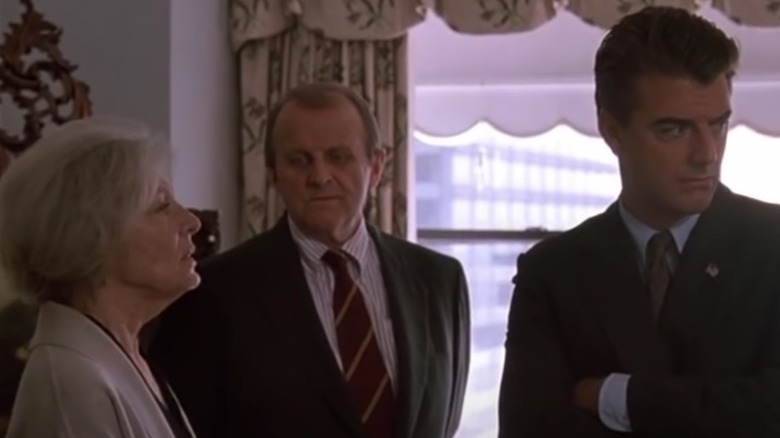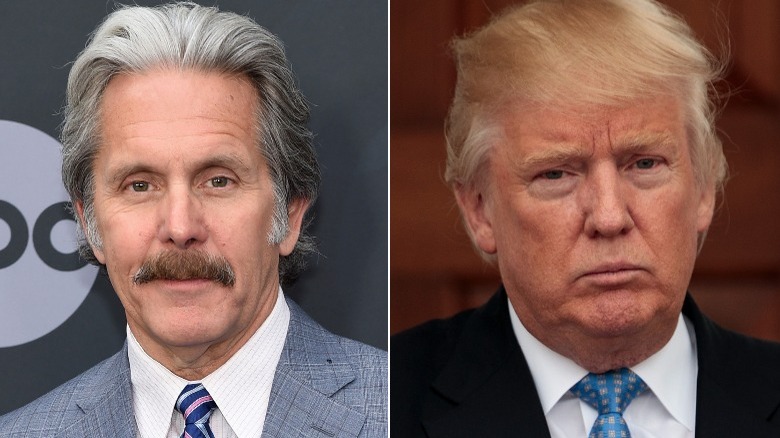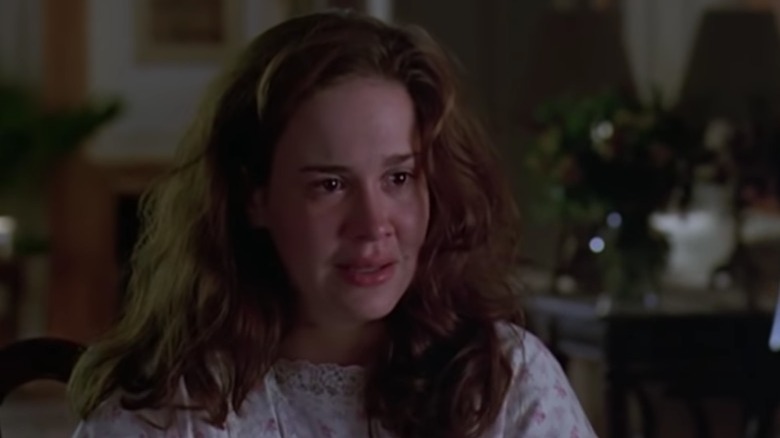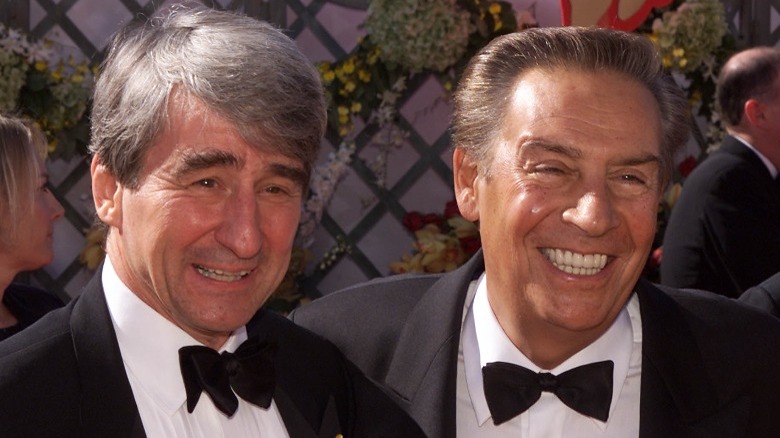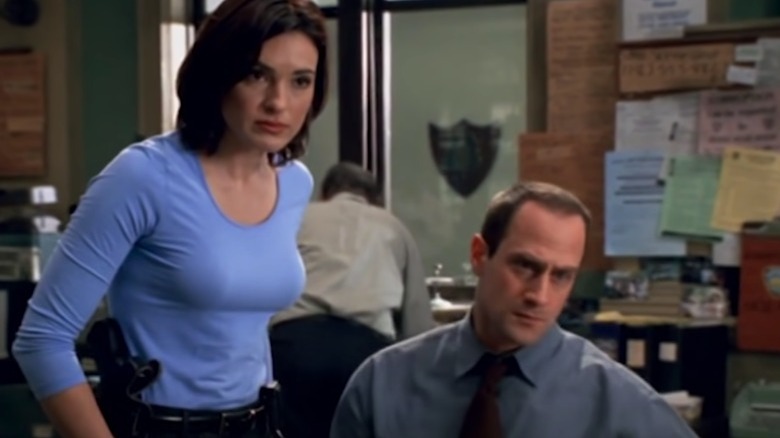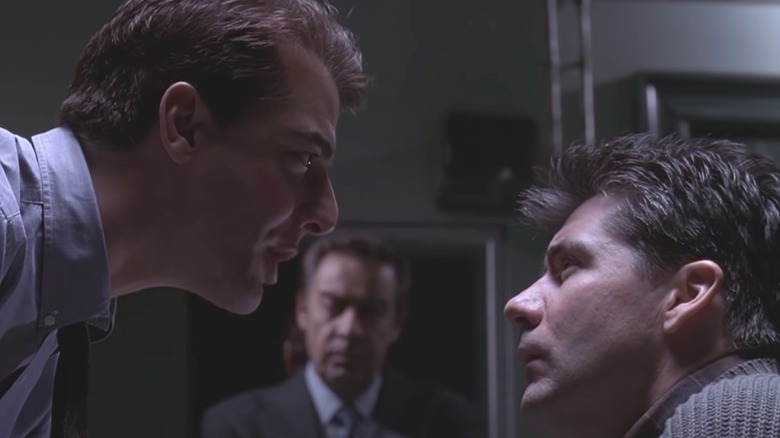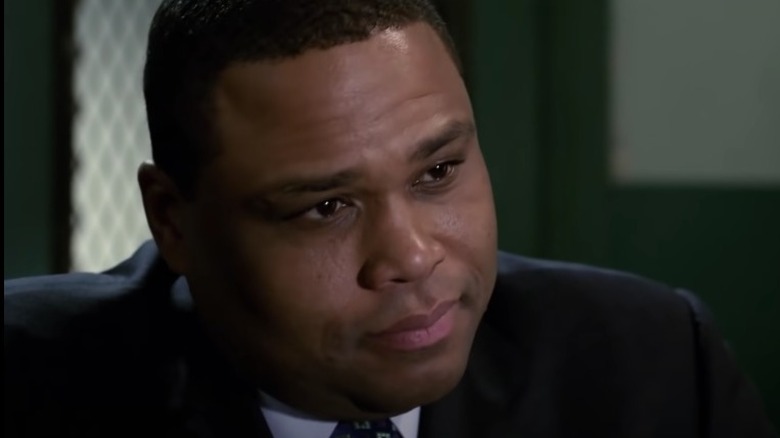The Untold Truth Of Law & Order
"Law & Order" is an undeniable titan of television. The original show, which ran on NBC for 20 seasons and 456 episodes, is inescapable in its influence on TV and popular culture. Every episode delivers a dramatic one-two punch of hard-boiled New York City legal action. The show's premise is simple: the first half of the program follows detectives; the second half follows the courts. But at the time of its initial release in 1990, this was a novel concept.
The show is so ubiquitous today, with multiple spinoffs airing on network television, in syndication and on streaming platforms, it might surprise you that "Law & Order” had humble beginnings just like any other television show. In fact, the success of "Law & Order ” was never promised and it faced its own crossroads of cancellation.
In the television network system, two separate yet equally important groups typically represent shows: the creatives who make the shows and the executives who program them. These are the untold truths of "Law & Order" (dun-dun).
Law & Order almost had a different name
The title "Law & Order" is brilliant in its simplicity, but the show's name was almost something quite different. In 1988, Dick Wolf, a former ad man-turned-screenwriter, had the idea for a show called "Night and Day." In the book "Law & Order: The Unofficial Companion," Wolf shares that "Night and Day" was one of several titles he toyed with for his television show idea. He also told Forbes he developed the show using the more crass title "Catch 'Em and Cook 'Em." "Law and Order" had already been used for several westerns, including a '50s film starring future president Ronald Reagan, but Wolf's show had no spurs or 10-gallon Stetson hats. It was all about the gritty, crime-ridden streets of contemporary New York City. Unrelated TV shows and films can often have the same title, with some even sharing the same contemporary release windows. There was little concern about confusing an old B-movie western with a glossy weekly television show, and thus the title "Law & Order" stayed.
The show had an old formula with a new twist
By the late '80s, crime procedurals were already nothing new to TV. Shows like "Dragnet," "Naked City," and "Perry Mason" followed the daily travails of police apprehending criminals and the defense attorneys tasked with representing the suspects. Characters like the no-nonsense Sgt. Joe "Just the Facts, Ma'am" Friday and clever defense attorneys like white-suited Ben Matlock became pop culture icons. However, Wolf's original idea was to bring a new twist to an old formula. He wanted to include a focus on the prosecution, something that had never been done in a legal show. The structure was simple: the first half of the show followed New York City detectives; the second half took place in the district attorney's office and the courts. "Law & Order" never deviated from this formula. As Wolf said in "Law & Order: The Unofficial Companion," this gave the show "structural integrity," making it "unsullied" to viewers even after long periods away from viewing.
Law & Order wasn't made for NBC
"Law & Order" and its subsequent spinoffs have been a linchpin of NBC's programming for over 30 years, generating millions of dollars in advertising revenue and thousands of hours of content — but in the beginning, Wolf originally sold the series to the upstart television network FOX. When it launched in 1986, FOX was a disruptor to the Big Three (ABC, NBC, CBS) television model of the previous decades; its lineup of edgy, youth-oriented shows like "Married... With Children" and "21 Jump Street" was sold as an alternative to the uptight programming of the network's competitors. "Law & Order: The Unofficial Companion" details how Barry Diller, then president of FOX, opinion, said he liked "Law & Order" but ultimately concluded "it wasn't a FOX show."
After being rejected at FOX, the show went to CBS, where a pilot episode was ordered but ultimately not picked up. Then it finally landed at NBC, with legendary television executives Brandon Tartikoff and Warren Littlefiled championing the show. During the 1980s, Tartikoff transformed NBC from a languishing has-been network into a television juggernaut. By programming hits like "The Cosby Show," "Miami Vice," and "Cheers," he made it the top television network for an unprecedented 68 weeks in a row (via The New York Times). Clearly, when Tartikoff liked a show concept, it was a good sign.
Law & Order was not an instant hit
When "Law & Order" premiered on September 13, 1990, the show was a critic's darling, but fans were slow to warm up to it. "Law & Order" didn't shy away from tackling tough, controversial storylines of the time; assisted suicide, abortion, and AIDS were all covered in the early seasons of the show. NBC executives understood there might be some resulting advertiser pushback, and were comfortable with that eventuality. In the book "Law & Order: The Unofficial Companion," Warren Littlefield explains that the series was built with some "advertiser fallout" in mind.
While the show's authenticity was appreciated by some, it was not immediately a ratings hit. In 1993, Littlefield told Wolf the show was in danger of being canceled if they didn't make adjustments to attract a mass audience. Specifically, Littlefield wanted the show to be less of a "men's club" and asked for more female characters (via Forbes). "Law & Order" met Littlefield's challenge and added characters Lt. Anita Van Buren, played by S. Epatha Merkerson, and Claire Kincade, played by Jill Hennessy. The addition of new characters reinvigorated the series and made it an all-out hit for NBC.
The show grew its audience in syndication
With the right cast in place, "Law & Order" was now a hit and primed for the ultimate TV money-making goals: reruns and syndication. Reruns of "Law & Order” began airing on the cable network A&E in 1994 to considerable success. When A&E's syndication deal with the show ended in 2002, the network was airing four hours of the show daily (via Houston Chronicle). A&E, however, wasn't able to pay the price of syndication, which had quadrupled since the original deal was made (via The Hollywood Reporter). Reruns then migrated to TNT, and eventually landed on broadcast television in 2011. The show is also firmly placed in the streaming world, with NBCUniversal offering the series on its streaming service, Peacock (via Forbes).
The show's procedural structure is a natural fit for syndication and with reruns airing throughout most of its run, the audience soon spanned multiple demographics and generations. S. Epatha Merekrson noted that young people tell her "Law & Order" got them through college (via E! News). For many students, nothing says taking a break between classes like a "Law & Order" rerun.
Real-life attorneys and police officers made the show as realistic as possible
In order to make the show as gritty and realistic as possible, "Law & Order" worked with many experts in the criminal justice system. The show hired former NYPD detectives to consult on the show and included actual attorneys in the writer's room to make sure the action and drama were accurate and true-to-life. William Fordes, a former Manhattan assistant district attorney, worked as a producer, writer, and consultant on the show, and told ABA Journal that "Law & Order" worked very hard for balanced depictions of the criminal justice system, with ambiguity a regular script goal. "Every case we ever cited on the show was accurate," said Fordes, "and every explanation was precise." Other staff members took Wolf's dedication to legal accuracy to heart. Michael Chernuchin, a practicing attorney before he joined the show's writing staff, told ABA Journal that they "never lied about the law" and wouldn't let the writing staff do anything that didn't happen in a court of law.
The ripped-from-the-headlines stories never shied away from real drama
The show's commitment to authenticity lends itself to ripped-from-the headlines episodes that were based on real-life events, from everyday crime to sensational celebrity stories. The writing staff were often inspired by sensational tabloid story coverage done by the New York Post. Chernuchin said the audience would recognize the initial story from real headlines, then the writers would take the plot in a different direction (via ABA Journal).
Celebrity tabloid culture was a driving force in public conversation in the '90s and '00s and "Law & Order" episodes didn't shy away from giving their takes on some of the most salacious stories of the day. Britney Spears and Kevin Federline's "chaotic" relationship, the death of child beauty queen JonBenet Ramsey, and the O.J. Simpson murder trial all inspired dramatic and shocking episodes of the series. These episodes don't directly address their sources of inspiration, but if you watched the news or glanced through a tabloid at the supermarket checkout, you would have been familiar enough with the stories to appreciate the creative license the "Law & Order" writers took with their subjects.
One episode that was too controversial to air
Some ripped-from-the-headlines stories are too controversial for even "Law & Order" to cover — for example, the episode of the "Law & Order" spinoff "Law & Order: SVU” featured a storyline based on then-presidential candidate Donald Trump. The episode, "Unstoppable," starred Gary Cole as a presidential candidate who faced accusation of sexual misconduct from several women. This episode was shuffled around the fall 2016 broadcast schedule several times by NBC, including a tentative air date one day after the presidential election. Ultimately, the network ultimately decided not to air it and finally shelved the episode after the "Access Hollywood" tape leak (via Variety) containing audio of Trump bragging to "Access Hollywood" host Billy Bush about past instances of sexual assault. The infotainment show was an NBC property, so this likely factored into the episode being bounced around the schedule like an unwelcome rubber ball. The real-life controversy hit a little too close to home, and even a powerhouse show like "SVU" was unable to escape the dictates of nervous network executives.
Many actors got their starts on the series
Going through the list of actors who had guest roles on "Law & Order" early in their careers is like looking through an old high school yearbook. Some of today's most-loved performers got their foot in the door through guest starring roles on the series. "Law & Order" was, for a time, the longest running live-action show on TV and with new stories every week, guest actors were a hot commodity. The series was filmed entirely in New York City, a metropolis filled to the brim with young, fresh acting talent waiting to get their big break on the small screen; powerhouse, award-winning actors like Sarah Paulson and Phillip Seymour Hoffman got their first credited roles on early episodes of "Law & Order." In 1994, Paulson played a 14-year-old girl being investigated for murder. Hoffman's 1991 episode had him portraying a man facing trial for rape. Other actors whose first credited onscreen roles come from the show include Emmy Rossum, Ginnifer Goodwin, and Leighton Meester.
Other actors used "Law & Order" to fill in their early acting resumes, with the show serving as a perfect platform for broad, national television exposure. Actors such as Idris Elba, Jennifer Garner, Kerry Washington, and Laverne Cox had their turn as guests on the show. If anything, all these credits prove that no one is an overnight success and a guest role serves as a rite of passage to acting success.
The show earned admiration from critics and lots of love from award shows
"Law & Order" intrigued critics from the start, with the first reviews in 1990 applauding the show for its original format, what The New York Times called "The Chase and The Trial." The show was praised by the Times for being "tightly paced and well-acted," although it was criticized by others, including The Hollywood Reporter, for being "leaden and contrived." Entertainment Weekly gave the show a B+, noting that it was "a little gimmicky, but it works."
It certainly worked during awards season. "Law & Order" received 51 Emmy nominations and six Emmys during its run, including Outstanding Drama Series in 1997. Actors Sam Waterston and Jerry Orbach won SAG Awards for their performances in 1999 and 2005, respectively. The series also won a Peabody Award in 1996 for its "tradition of excellence," praising the show for being "offbeat and insightful" in the way it "captures the frustration and exhilaration of the pursuit of justice." Even TV Guide, the venerable voice of the average TV watcher, ranked "Law & Order" #24 in their "TV Guide Top 50 Shows of All Time" list published in 2009. It's not too bad being ranked above "M*A*S*H" and just below "Nightline."
It was such a hit that it spun off a Law & Order entertainment universe
"Law & Order” aired for 20 seasons, ending its run in 2010. During those two decades and after, the show spawned a television procedural universe including made-for-TV movies, TV shows, and video games. The first step into universe expansion happened in 1998, with a made-for-TV movie, "Exiled: A Law & Order Movie," which followed "Law & Order" character Det. Mike Logan (played by Chris Noth) three years after his final appearance on the original show.
With the success of "Exiled," a franchise was born. What could be considered one of TV's most successful spinoffs, "Law & Order: SVU” launched in 1999 and is still producing original episodes — as of 2021, it's now the longest-running primetime live-action series of all time (via AV Club). "SVU” is so successful that it even has its own spinoff, "Law & Order: Organized Crime." No other "Law & Order ” spinoff matches the wild success of "SVU," but it doesn't mean that the franchise hasn't tried. Five other spinoff series have been produced to varying degrees of success with shows like "Law & Order: Criminal Intent" (successful) and "Law & Order: LA." (not so successful). The franchise was so popular that it even had video game adaptations in the early 2000s. Legacy Interactive released four "Law & Order” PC games, with actors voicing their roles from the series (via TV Insider).
That Law & Order sound
The soundscape of "Law & Order" is nothing if not memorable. It would be hard to find a person who couldn't identify the "dun-dun" (also referred to as the "doink-doink," "jum-jum," and "bong-bong") that's heard in every episode of the "Law & Order" franchise. It's a sonic combination of a jail cell door slamming, a courtroom gavel dropping, and the sound of a bunch of men stomping their feet (via The New York Times). The creator of the sound effect, composer Mike Post, understood the assignment for scoring the series: to make a mood. Post told Entertainment Weekly in 1993 that the intent of the sound, which he called "The Clang," was to be a "stylized sound of a jail cell locking."
The "Law & Order" theme song, also composed by Post, is just as successful at creating a narrative mood. The clarinet melody, funky bass, and bluesy guitar riff place the show both in and out of time. It's not trendy and fresh, but the combined elements sound steadfast, authentic, and comfortably familiar, all the attributes that have made "Law & Order" a TV hit for over 30 years.
A Law & Order revival
If you've missed the original "Law & Order" you're in for a treat: It's coming back to television with original episodes. Proving that no show is ever really canceled, NBC has ordered a revival of the series — not a reboot or a reimagining, but a straight-up continuation of the series, with Dick Wolf telling Variety this will be "Season 21" and adding, "I never give up on things I believe in." There will be no major changes to the "Law & Order" formula — Wolf wants to continue "telling really great stories." Familiar faces will be back for Season 21, including Anthony Anderson, who was in the main cast of Season 18–20 as Det. Kevin Bernard. In addition to returning players, new cast members have been announced. Actor Hugh Dancy joins the series as an assistant district attorney, Jeffrey Donovan will play a police officer (via TV Line), and legal drama veteran Cameron Manheim is set to portray Lieutenant Kate Dixon (via Variety).
